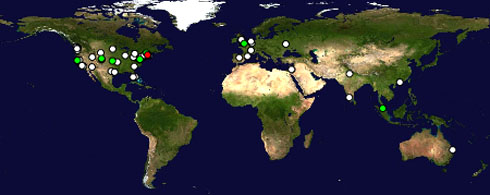Tumblr is having a moment. A big profile in the Times, a lot of buzz in the geekier precincts of the interwebs, phenomenal growth (the service adds 25,000 new accounts daily). For the uninitiated, Tumblr is a platform for “short-form blogging,” meaning that a “tumblelog” is a blog with very short posts, usually a single, found object — a quote, image, song, or video — offered with little or no comment. “If blogs are journals, tumblelogs are scrapbooks,” the Tumblr web site used to explain helpfully. Essentially it is a place to share the little interesting things you find as you wander around the internet. It is not a place for long, navel-gazing essays. Here are a few good tumblelogs to give you a sense of it: Fuck Yeah, Literary Quotes, ck/ck, and Laughing Squid.
Lately I’ve been fiddling around with Tumblr and I am smitten. While I was cranking through the final rewrite of my latest novel the last few weeks, Tumblr became my main diversion. (I have so many.)
I can see the enormous potential of Tumblr. It has a social-networking aspect: you can follow people as you do on Facebook or Twitter, and view their posts in a Twitter-like stream. But it is more interesting than either of these, since Facebook does not have interesting content (my feed is mostly filled with snapshots of friends’ kids) and Twitter is straitjacketed by its 140-character format. Tumblr is also beautifully designed and dead simple to use.
The primary drawback of Tumblr, it seems to me, is that there just aren’t enough users yet to make it really compelling. As a link farm, Tumblr’s format kicks Twitter’s ass. The links I find on Twitter are cloaked behind those opaque fortune-cookie messages, and of course they require a click-through to see what the content really is. Very inefficient. My Tumblr feed is a lot easier to read. But Twitter has so many more interesting users than Tumblr that it is still my first stop when I go snuffling around the web for interesting reading material. (My second stop: Google Reader, still.)
Inevitably, I have started my own tumblelog. I will still post my “real” blog entries here at my grown-up blog. But for the little things I find laying around the web — like, say, a video of a naked man putting himself through a hay baler — Tumblr is the scrapbook where I’ll paste them. Come check it out. We’ll see how the new tumblelog develops over the next few months.
(Note: Must … resist … reference … to Culture Club. D’oh!)
